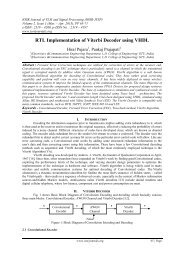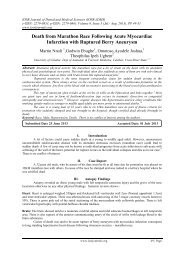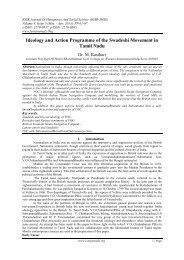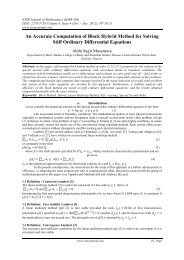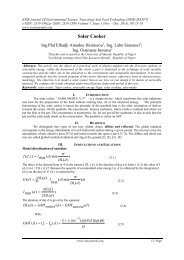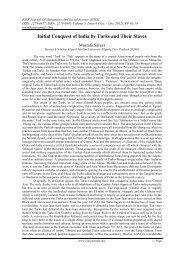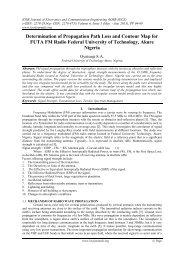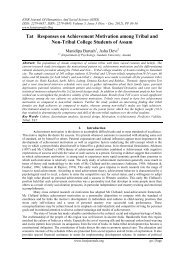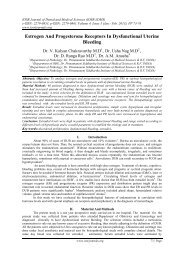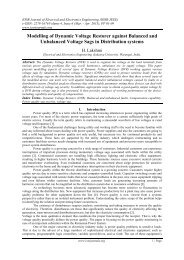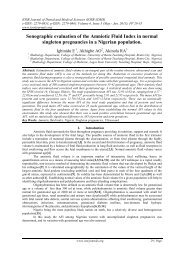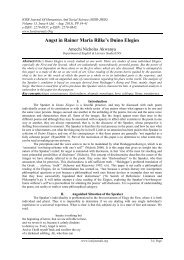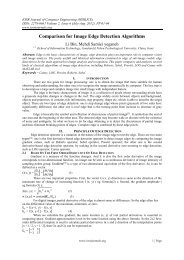Design Compatibility of Classroom Furniture in Urban and ... - IOSR
Design Compatibility of Classroom Furniture in Urban and ... - IOSR
Design Compatibility of Classroom Furniture in Urban and ... - IOSR
Create successful ePaper yourself
Turn your PDF publications into a flip-book with our unique Google optimized e-Paper software.
Div<strong>in</strong>e Revelation <strong>in</strong> Yoruba Traditional Religion <strong>and</strong> In Christianity<br />
Jesus Christ was the ultimate revelation <strong>of</strong> God (Jn. 14:9) culm<strong>in</strong>ated <strong>in</strong> the exclusive claim that Christians are<br />
the new People <strong>of</strong> God, <strong>and</strong> that made the Jews to be regarded as the old People <strong>of</strong> God. Jesus Christ is reported<br />
as congratulat<strong>in</strong>g the Apostles, say<strong>in</strong>g: “I tell you solemnly, many Prophets <strong>and</strong> holy men longed to see what<br />
you see, <strong>and</strong> never saw it; to hear what you hear, <strong>and</strong> never heard it” (Mt. 13:17). That is a form <strong>of</strong> special<br />
revelation. Dulles (1992:101), writ<strong>in</strong>g on the subject <strong>of</strong> special <strong>and</strong> absolute claim on revelation, notes that: “the<br />
limitations imposed by the particularities <strong>of</strong> time <strong>and</strong> culture, has difficulty <strong>in</strong> admitt<strong>in</strong>g that there can be any<br />
absolute or unsurpassed disclosure with<strong>in</strong> history.” On a much more elaborate note, Haught (1996:885)<br />
observes that:<br />
In order to obviate arrogance, many contemporary theologians emphasize that the primary mean<strong>in</strong>g <strong>of</strong><br />
revelation is God‟s gift <strong>of</strong> self to the world. Such a formula prohibits our restrict<strong>in</strong>g this gift to a specific<br />
Church community. Revelation <strong>in</strong> its fundamental mean<strong>in</strong>g is universal. If we still cont<strong>in</strong>ue to speak <strong>of</strong> a<br />
special historical revelation, we do not mean that it is special <strong>in</strong> the sense that the people to whom it is<br />
communicated are thereby superior to other human be<strong>in</strong>gs. Nor do we mean that they are any more valued by<br />
God.<br />
The biblical basis for emphasiz<strong>in</strong>g that “God‟s gift <strong>of</strong> self to the world” is universal is found <strong>in</strong> such<br />
passages as Romans 1:20, where the author notes that: “Ever s<strong>in</strong>ce God created the world, his everlast<strong>in</strong>g power<br />
<strong>and</strong> deity - however <strong>in</strong>visible - have been there for the m<strong>in</strong>d to see <strong>in</strong> the th<strong>in</strong>gs he has made”. Psalm 50:12 also<br />
quotes God as say<strong>in</strong>g that “the world <strong>and</strong> all it holds is m<strong>in</strong>e”. By way <strong>of</strong> application, with specific reference to<br />
the Roman Catholic Church, Scanlon (1994:749) observes that:<br />
With the new appreciation <strong>of</strong> world religions, the Roman Catholic Church has <strong>in</strong> pr<strong>in</strong>ciple extended the<br />
need for ecumenical conversation beyond the Christian pale. As Catholics, we are Christocentric, but we are not<br />
Christomonist. While we witness to Christ <strong>in</strong> our dialogue with people <strong>of</strong> other religions, we would expect to<br />
learn more about the God <strong>of</strong> Jesus who is Promise for all people.<br />
That seems to represent the current position <strong>in</strong> the liberal Roman Catholic <strong>and</strong> Protestant camps. Taylor<br />
(1976: v), who was an <strong>of</strong>ficial <strong>of</strong> the World Council <strong>of</strong> Churches, once observed that: “Our neighbours with<br />
primal views on life <strong>and</strong> ways <strong>of</strong> life have much to teach us” (just as Christians may have much to teach them,<br />
s<strong>in</strong>ce only God is said to be omniscient). Human be<strong>in</strong>gs can always learn from one another, generally speak<strong>in</strong>g,<br />
if there is humility <strong>and</strong> openness <strong>of</strong> m<strong>in</strong>d. Jesus Himself is quoted as say<strong>in</strong>g, on several occasions, about some<br />
Gentiles, that: “In truth I tell you, <strong>in</strong> no one <strong>in</strong> Israel have I found faith as great as this” (Matt. 8:10; Like 7:9).<br />
The forego<strong>in</strong>g is a testimony to the fact <strong>of</strong> some amazement <strong>in</strong> the content <strong>of</strong> the philosophy, theology,<br />
<strong>and</strong> general epistemology <strong>of</strong> peoples, such as Africans, who lay no claim to special revelation as <strong>in</strong> Judaism,<br />
Christianity, <strong>and</strong> Islam.<br />
The po<strong>in</strong>ts highlighted by Scanlon <strong>and</strong> Taylor make it reasonable <strong>and</strong> fair to assume that like the<br />
biblical hagiographers, African sacred artists are both <strong>in</strong>spired <strong>and</strong> <strong>in</strong>errant, as far as humanly possible, s<strong>in</strong>ce<br />
God is also the Lord <strong>in</strong> their historical narratives, <strong>in</strong> their myths <strong>and</strong> other forms <strong>of</strong> fiction. Realis<strong>in</strong>g how God<br />
blessed a Gentile household, Peter could not help say<strong>in</strong>g: “The truth I have now come to realise is that God does<br />
not have favourites, but that anybody <strong>of</strong> any nationality who fears God <strong>and</strong> does what is right is acceptable to<br />
him” (Acts 10:34). The statement expresses God‟s impartiality <strong>in</strong> respect <strong>of</strong> every people <strong>and</strong> <strong>in</strong>dividual human<br />
be<strong>in</strong>g created <strong>in</strong> the imago Dei.<br />
One discovered that traditional Africans don‟t know such personalities as Abraham, Moses, David, <strong>and</strong><br />
Jesus Christ, but along with the name <strong>of</strong> God, certa<strong>in</strong> names are found <strong>in</strong> their oral <strong>and</strong> the emerg<strong>in</strong>g literary<br />
traditions. Among the Yoruba, for <strong>in</strong>stance, the people <strong>of</strong> Ile-Ife are not likely to ever forget Lady Moremi who<br />
is said to have risked her life, <strong>and</strong> <strong>of</strong>fered her only son, Oluorogbo, <strong>in</strong> sacrifice for the liberation <strong>of</strong> her people.<br />
Likewise, the Ijesha Yoruba immortalize the name <strong>of</strong> Obokun, who played a role that was similar to<br />
that <strong>of</strong> Moremi, <strong>and</strong> the Egba Yoruba commemorate their ancient political liberator, Lishabi (Biobaku, 1991:8-<br />
11,32). For the Yoruba <strong>of</strong> Ijebu-Ode it is Obanta, while the Ibadan Yoruba celebrate the memory <strong>of</strong> Oluyole.<br />
Collectively speak<strong>in</strong>g, Oduduwa corresponds <strong>in</strong> Yoruba context to Father Abraham <strong>in</strong> Judaeo-Christian history<br />
(Ajayi <strong>and</strong> Smith, 1971:1-2) . Many local martyrs, heroes <strong>and</strong> hero<strong>in</strong>es are also known <strong>in</strong> traditional African<br />
societies <strong>and</strong> communities, <strong>in</strong> whose bibliographies God can be said to have revealed Himself <strong>in</strong> a special way.<br />
Jesus Christ is quoted as say<strong>in</strong>g: And I tell you that many will come from east <strong>and</strong> west <strong>and</strong> sit down with<br />
Abraham <strong>and</strong> Isaac <strong>and</strong> Jacob at the feast <strong>in</strong> the k<strong>in</strong>gdom <strong>of</strong> heaven; but the children <strong>of</strong> the k<strong>in</strong>gdom will be<br />
thrown out <strong>in</strong>to the darkness outside, where there will be weep<strong>in</strong>g <strong>and</strong> gr<strong>in</strong>d<strong>in</strong>g <strong>of</strong> teeth (Matt. 8:11-12).<br />
The bottom l<strong>in</strong>e is that whether <strong>in</strong> Christianity, ATR or any other authentic religion <strong>and</strong> culture, it does<br />
not seem that God has left anybody or people without reveal<strong>in</strong>g Himself to them, one way or another, whether <strong>in</strong><br />
the past or at the present time, <strong>and</strong> on cont<strong>in</strong>uous basis. The modes <strong>of</strong> revelation have also been found to be<br />
similar <strong>in</strong> many respects. God is said to have revealed Himself to human be<strong>in</strong>gs through the created order, oral<br />
<strong>and</strong> written traditions, some human mediums, historical experiences, conscience, creative <strong>and</strong> philosophical<br />
works <strong>of</strong> art, as well as <strong>in</strong> dreams <strong>and</strong> visions. Of course, each case requires discernment for authentication <strong>in</strong><br />
its own context.<br />
www.iosrjournals.org<br />
75 | Page



